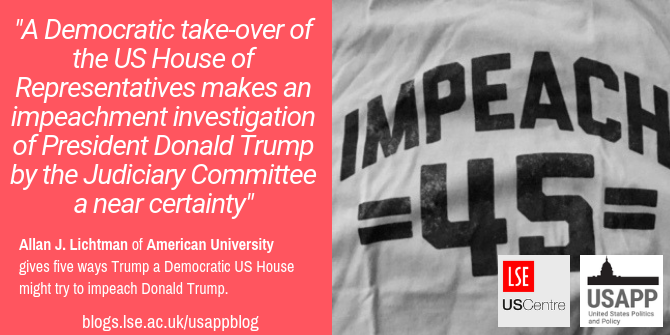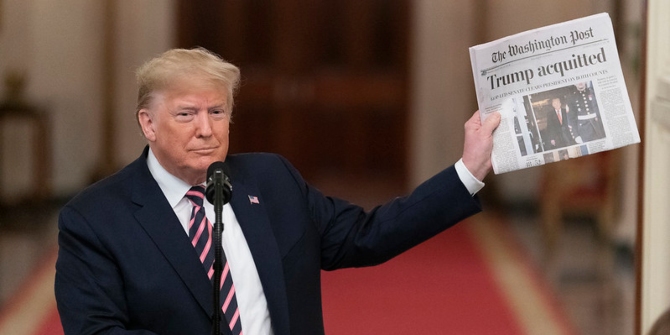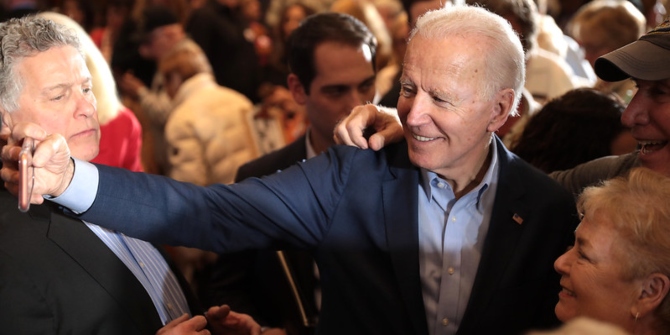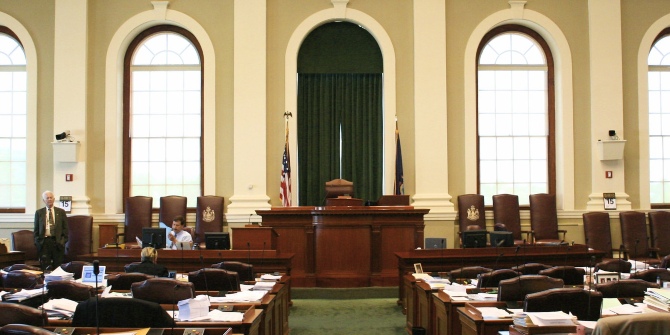 It looks increasingly likely that the Democratic Party will retake the US House of Representatives in the upcoming midterm elections. If there is such a takeover, the temptation for House Democrats to launch impeachment proceedings against President Trump may be too difficult to ignore. Allan J. Lichtman outlines five potential grounds for impeachment: violations of the Emoluments Clause of the Constitution; conspiracy with Russia; obstruction of justice; violating campaign finance laws; and financial crimes arising from his 1990s tax schemes.
It looks increasingly likely that the Democratic Party will retake the US House of Representatives in the upcoming midterm elections. If there is such a takeover, the temptation for House Democrats to launch impeachment proceedings against President Trump may be too difficult to ignore. Allan J. Lichtman outlines five potential grounds for impeachment: violations of the Emoluments Clause of the Constitution; conspiracy with Russia; obstruction of justice; violating campaign finance laws; and financial crimes arising from his 1990s tax schemes.
- This article is part of our ‘Making Sense of the Midterms’ series curated by Rob Ledger (Schiller University) and Peter Finn (Kingston University) and published in tandem with the LSE US Centre’s public event on that theme on 7 November 2018
The Democratic Party leadership won’t talk about it for fear of stirring up Republican voters. But a Democratic take-over of the US House of Representatives makes an impeachment investigation of President Donald Trump by the Judiciary Committee a near certainty.
The work of Special Counsel Robert Mueller, which probes criminal activity, is not a substitute for an impeachment investigation. The framers of the US Constitution agreed on broad standards for impeachment and assigned this to elected officials. They ensured that the fate of presidents would depend on the combined political, practical, moral, and legal judgment of the peoples’ representatives. As Alexander Hamilton explained, impeachments broadly cover “the abuse or violation of some public trust” and are properly “denominated POLITICAL.”
Here are five potential grounds for impeachment that the House Judiciary Committee could explore:
-
Violation of the Emoluments Clause of the US Constitution
To guard against foreign leverage, the framers placed in the US Constitution a prohibition against a president from taking anything of value from foreign governments and their agents. The Emoluments Clause is absolute; no quid pro quo is required. Any economic benefit from a foreign government triggers a constitutional violation, punishable by impeachment. In 1788 Governor Edmund Randolph of Virginia, a delegate to the Constitutional Convention, said that the Constitution guarded against “the president receiving emoluments from foreign powers. If discovered, he may be impeached.”
By failing to divest his business enterprises, including far-flung investments in foreign nations, Donald Trump is almost certainly in violation of the Emoluments Clause. Both the foreign policies of the United States and decisions by foreign governments impact the profitability of his international holdings. Foreign governments are further providing emoluments by patronizing his properties within the United States.
-
Conspiracy with the Russians
The publicly known evidence establishes that members of the Trump team conspired with the Russians during the campaign. The case for Trump’s involvement or knowledge is circumstantial, but far more may yet come from the Special Counsel.
On June 9, 2016 Kremlin- connected Russians met with the highest echelons of the Trump campaign— son Donald Trump Jr., son-in-law Jared Kushner, and then– campaign manager Paul Manafort. Rob Goldstone, the manager for pop singer Emin Agalarov, who is the son of Russian oligarch Aras Agalarov, arranged the meeting to provide “some official documents and information that would incriminate Hillary” as “part of Russia and its government’s support for Mr. Trump.” Trump Jr. responded, “Seems we have some time and if it’s what you say I love it especially later in the summer.”
According to the guilty plea of George Papadopoulos, a foreign policy adviser to the Trump campaign, Trump was present at a 12-person meeting when Papadopoulos revealed his Russian connections and proposed setting up a Trump/Putin meeting.
Trump openly invited Russia to interfere with the 2016 election and to commit a crime by hacking into a private email server. In July 2016 Trump said, “Russia, if you’re listening, I hope you’re able to find the 30,000 emails [of Hillary Clinton] that are missing. … They probably have them. I’d like to have them released.”

““Next week’s jury duty shirt just arrived.” ? ? ?” by anokarina is licensed under CC BY SA 2.0
-
Obstruction of Justice
There is at least as robust an obstruction of justice case against President Trump as there was against President Bill Clinton, on a far more consequential matter than a consensual, personal affair. The obstruction began when Trump delayed firing then–National Security Advisor Michael Flynn for eighteen days after the Acting Attorney General had warned that the Russians likely had compromised Flynn.
Former FBI Director James Comey testified under oath that Trump asked him for personal loyalty and to “let go” the Flynn investigation. Trump then fired Comey, and then later admitted that he had “Russia on his mind” in doing so. The New York Times reported that Trump pressured top Republicans, including the chairman of the Senate Intelligence Committee, to end the Russia investigations. To derail the House Intelligence Committee’s Russia investigation, Trump’s White House colluded with Committee Chairman Devin Nunes. The President drafted the misleading statement that sought to whitewash the Trump Tower meeting and divorce it from Russian help in the campaign.
-
Violation of Campaign Finance Laws
During his guilty plea for violating campaign finance laws, lawyer Cohen testified under oath that Donald Trump instructed him to pay hush money to women alleging affairs with then candidate Trump. These payments, Cohen testified, were not made to protect the Trump family, but to shield the campaign from embarrassing disclosures. Trump has admitted in a Fox News interview that the payments “came from me.” Although a candidate can make unlimited contributions to his own campaign, Trump’s obviously knowing and willing failure to report these contributions publicly to the Federal Election Commission is a felony under federal law.
Willful violations of campaign finance laws are high crimes, not trivial matters as Trump has claimed. Congress enacted these laws to guard against the corruption of democratic elections in the United States.
-
Financial Crimes
An exhaustive investigation by the New York Times found that Donald Trump had engaged in “dubious tax schemes during the 1990s, including instances of outright fraud” to evade $413 million in tax payments. The Constitution imposes no time limit on impeachable offenses. The House impeached, and the Senate convicted federal judge G. Thomas Porteous, in part for offenses committed prior to assuming the federal bench. Trump’s Attorney General and then Senator Jeff Sessions said after voting for Porteous’ conviction, “I do not believe that evidence of acts committed before confirmation should be withheld from consideration in the impeachment process.” The Judiciary Committee can probe whether Trump’s alleged tax evasion continued during his presidency and whether he has committed other financial offenses such as the laundering of Russian criminal money.
Although impeachment requires only a majority vote of the US House, conviction and removal occurs only after a trial by the US Senate and a vote by two-thirds of the Senators present. Regardless of the outcome of the midterm elections, a conviction will depend on truly shocking findings from the Special Counsel.
Please read our comments policy before commenting.
Note: This article gives the views of the author, and not the position of USAPP – American Politics and Policy, nor the London School of Economics.
Shortened URL for this post: http://bit.ly/2O7x5r1
About the author
 Allan J. Lichtman – American University
Allan J. Lichtman – American University
Allan J. Lichtman is Distinguished Professor of History at American University in Washington, D.C. and author of The Case for Impeachment 2nd ed. (Dey Street Books, 2018).






